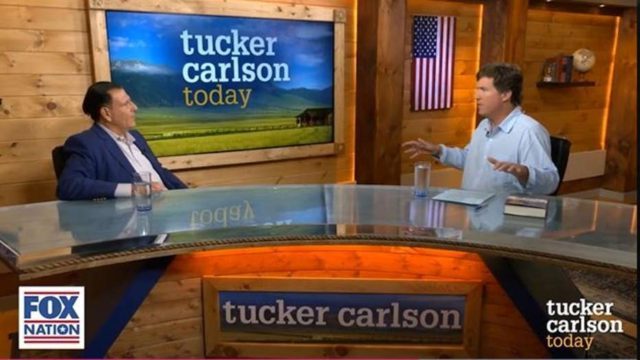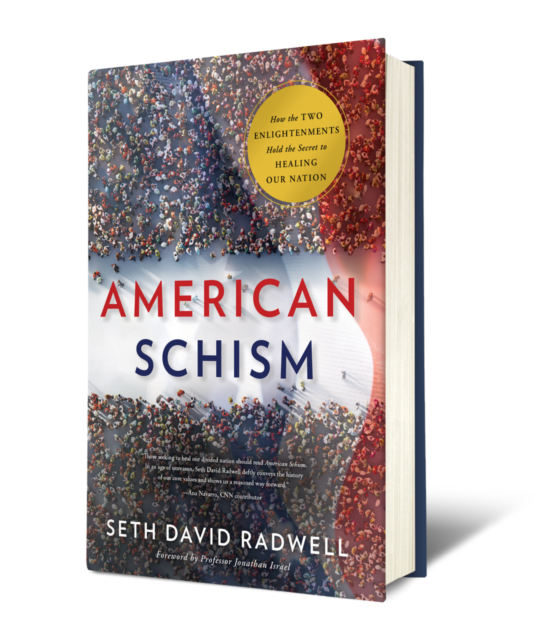
Seth David Radwell discusses American Schism with Tucker Carlson
AMERICAN SCHISM: HEALING A DIVIDED NATION
Smithsonian Associates lecture
Monday, September 13, $25, 6:45
www.si.edu
americanschismbook.com
During the pandemic, I had a regular Zoom happy hour with a group of longtime friends going back to nursery school and grade school. Our politics were all similar, so we avoided fights about Trump, Fauci, the Supreme Court et al. One of our regulars was Seth David Radwell, who, following a successful business career that has included being the head of e-Scholastic and Bookspan and president and CEO of direct-to-consumer company Guthy-Renker, was so disturbed by the state of political discourse across the nation that he wrote a book about it.
American Schism: How the Two Enlightenments Hold the Secret to Healing Our Nation (Greenleaf, June 29, $25.95) examines our current partisan situation, and inability to talk to one another about virtually anything without it becoming political, through the lens of the two Enlightenments of the eighteenth century, the Radical and the Moderate. Radwell is on a furious book tour, making appearances on numerous podcasts and online interview shows. On September 13 at 6:45, he will deliver a lecture, “American Schism: Healing a Divided Nation,” as part of the Smithsonian Associates streaming series.
Radwell writes in the prologue of his book, “As I hunkered down at home to weather the global COVID-19 pandemic of 2020, I struggled to overcome the sense of shock at how suddenly and utterly our world had been turned upside down. But as I contemplated my state of mind, oscillating rapidly between depression, anxiety, and frustration, I sensed that well before the onslaught of the pandemic I had already fallen into a profound state of disillusionment. As the world came to a halt, the health crisis simply gave me the time and space to realize it. The root cause of this disillusionment was related to the shattering of an ideal image that I had, perhaps, clung on to for far too long.”
He continues, “How had it come to be that over the last four years my entire conception of the American credo had crumbled? My vision of America was firmly rooted in the ethos of both freedom and equality; my America was a place where everyone had a fair shot at building a rewarding and fulfilling life, where each individual could define their own idiosyncratic version of success, and where we collectively formed a country of shared values with mutual respect for individual differences. That vision felt unambiguously inconsistent with the America of 2020. Just how and when did my America disappear? Did my vision of America ever exist at all, or was it but a myth? If it did exist, how did it disintegrate so quickly in just a few years? Or was its ruin a slow process of decay that began undetected (by me) much earlier? I was determined to explore these questions, to understand the origins of my disillusionment.”
Radwell not only searches out the causes but provides answers for how we can move forward together. One of his themes is getting the two Americas to talk to each other in a reasonable manner. He brought this plan into reality recently when he sat down for a long-form interview on Tucker Carlson Today, for which some of his readers chastised him. “I received an onslaught of feedback related to my appearance on Tucker Carlson Daily on Fox Nation and the clip shown on his evening cable show,” he wrote in an email blast to his subscribers. “Some chided me for appearing on Fox since the station has a ‘track record of misinformation and propaganda masquerading as news,’ as one person wrote me. Others congratulated me for having the ‘courage’ to appear on such a venue.” The divide is everywhere.
Amid a flurry of interviews and his preparation for the Smithsonian lecture, Radwell took the time to answer questions about the Counter-Enlightenment, reason and unreason, top-down populism, Tucker Carlson, fine wine, and more.
twi-ny: You’ve been working on the book for several years; what effect did the pandemic lockdown have on your research and writing?
seth david radwell: It’s been about three years, although I had developed some of the ideas before that. I have been reading and researching the thesis actively starting in late 2018. I had much material in the form of notes up through 2019. But it was March 2020 when COVID first hit that I sat down and began writing every day in intense twelve-hour sessions. Since that time I have been working on it full-time.
twi-ny: In addition to discussing the two Enlightenments, you also delve into the Counter-Enlightenment, tracing it to the Second Great Awakening, the religious fervor of the first decades of the nineteenth century, as well as anti-elite and anti-intellectual sentiments. Would you characterize the American right’s embrace of Hungarian dictator Viktor Orbán, or Tucker Carlson’s recent encomium to the Taliban, as an expression of top-down populism (populist sentiments exploited by elite actors for their own ends), the Counter-Enlightenment, or something more ominous?
sdr: There is certainly a global trend toward autocracy characterized by “strongmen” who win some sort of election to gain legitimacy but then consolidate, usurp and abuse power, and begin curtailing the freedoms associated with an open liberal society. The American right has embraced this. One of the tools that most of these autocrats deploy, along with those associated with Trumpism, is the top-down populism described in the book.
At the same time, as I discuss in the book, populism is complex — there are many strains of it, often with both positive and negative characteristics. The top-down populism we are talking about here is an emotional appeal that plays on people’s fears of both the “other” (immigrants, African Americans, Latinos, etc.) as well as the elite establishment (who they perceive has ignored their concerns for too long). Autocratic politicians are hostile to elite institutions, and to expertise in general, and pronounce these feelings regularly to gain support and relate to their base. Because this later trend rejects expertise overall, it is also hostile to truth and data. That is the Counter-Enlightenment.
twi-ny: In the current political climate, do you have a recommendation for accommodating both Counter-Enlightenment forces as well as the Radical and Moderate Enlightenment thinkers, or must one be decisively excluded from power?
sdr: “Counter-Enlightenment forces” can be a confusing phrase. For example, most religious movements are based in faith and rely less on reason. So these are Counter-Enlightenment forces that are very much involved in the lives of most Americans. But our republic was founded on the premise that these domains should be kept outside the civic arena — with a firm separation of church from state. This has been frequently violated in our history — as one example, Billy Graham was quite close and influential to many presidents.
twi-ny: In researching and writing the book, did you reconsider a specific political belief you have held?
sdr: Yes, I had always considered myself fairly left leaning, but I began to appreciate aspects of conservative/libertarian philosophy more thoroughly.
twi-ny: How did your business experience help you when marketing the book?
sdr: Well, there is no question that my marketing expertise has played a role. But most ventures I led professionally (i.e., Proactiv) were multimillion-dollar brands with huge advertising budgets. My marketing of the book has been mostly guerrilla tactics and “hand selling” that I am doing personally as a labor of love.
twi-ny: As part of that hand selling, you’ve been interviewed on many podcasts, in lieu of in-person readings and signings. Were you a podcast listener prior to the pandemic? If so, what are some of your favorites?
sdr: Yes, I love podcasts, mostly of the NPR variety — I was a religious listener to Ezra Klein on VOX Media.
twi-ny: You recently appeared on Tucker Carlson Today and managed to have a productive and engaging discussion. What was that experience like?
sdr: He was extremely generous, thoughtful, and open to the ideas in the book. Quite a different persona than his cable “news” show at night.
twi-ny: Did meeting him in that way change any feelings you previously might have had about him?
sdr: He is very intelligent and deeply appreciative of the ideas in American Schism. His on-air celebrity status is an entirely different matter.
twi-ny: On September 13 at 6:45, you will be delivering the Smithsonian lecture “American Schism: Healing a Divided Nation.” What will you be concentrating on?
sdr: The session will summarize certain aspects of the book but will focus on the path forward out of this mess, delineating both structural changes and mindset changes that can begin the healing process.

twi-ny: Is America in as much trouble as it seems?
sdr: The fundamental change begins with taking back control of the debate from the extremes to the frustrated majority.
twi-ny: American Schism has been a great success, reaching #1 on Amazon. What were your initial goals in writing the book?
sdr: It has been doing well, but remember it has gone to #1 on Amazon in very niche categories, like rational philosophy and civics. In the broader areas such as comparative politics and political parties, it has often been a top-ten bestseller.
twi-ny: What’s your next step?
sdr: I would like to build a ground-up movement, which I call Fight Unreason with Reason, by sharing the ideas in the book with a larger audience. So I am hopeful the book will gain more momentum in the months forward. But we are off to a good start. My biggest hope is the viral marketing element — that readers who appreciate the ideas share them. For example, of the seventy-five reviews on Amazon, sixty-nine are five-star, so most readers like the book so far.
twi-ny: You’re a gourmand and wine connoisseur with a partner who knows his way around the kitchen. What is the latest amazing meal the two of you have had at home, and what wine did you have to go with it?
sdr: I am very lucky to have such an excellent cook as a partner. Tonight he is preparing roasted Cornish hens with braised vegetables. I will open a Grand Cru burgundy to pair, but I haven’t picked it yet.
twi-ny: You are also a big-time theater and opera fan. Have you been to any live indoor performances yet?
sdr: I have not yet been back to performances, with the exception of Tony Bennett and Lady Gaga at Radio City. I love opera and theater and I miss both terribly. But the positive is that without them, I have had more time to focus on the book.